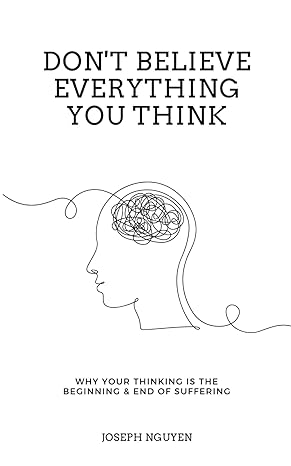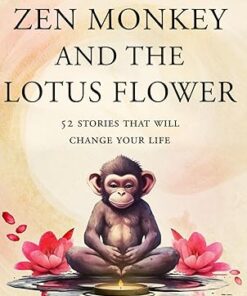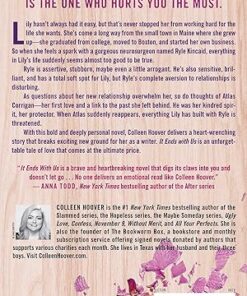 |
|
Introduction
In a world filled with constant distractions, conflicting opinions, and a barrage of information, it can be challenging to discern the truth from the noise. This is where the book “Don’t Believe Everything You Think” comes into play. The title itself is a powerful reminder that not all thoughts are based on reality or truth. The book delves into the intricacies of human thought patterns, challenging readers to question their beliefs, assumptions, and the narratives they tell themselves. In this Review, we will explore the author’s background, the core concepts of the book, reader feedback, and the essential message it conveys to its audience.
About the Author
The author of “Don’t Believe Everything You Think” is known for their deep insights into cognitive psychology and mindfulness. Joseph Nguyen is the author of the #1 international bestselling book, Don’t Believe Everything You Think, which has been translated into 31+ languages. He is a writer who helps others realize who they truly are beyond their thinking and conditioning to live an abundant life free from psychological and emotional suffering.
When he’s not busy petting his 3 cats that he’s allergic to, he spends the rest of his time writing, teaching, speaking, and sharing timeless wisdom to help people discover their divinity from within and how they are the answer they’ve been looking for their entire lives.
You may visit his website at www.josephnguyen.org for more books, resources, and videos to help you on your journey.
What is the Book “Don’t Believe Everything You Think” About?
This book is a thought-provoking book that explores the nature of human thoughts, how they are formed, and how they influence our perception of reality. The book challenges the notion that every thought we have is valid. Instead, it encourages readers to critically examine their thoughts and understand that many of them are simply a result of subconscious programming, societal influences, or past experiences.
Key Concepts Covered in the Book
- The Power of Thoughts: The book starts by explaining how powerful thoughts can be. Thoughts influence emotions, actions, and ultimately, our reality. However, not all thoughts are based on facts; many are distorted or irrational. Understanding this is the first step to gaining control over one’s mind.
- Cognitive Distortions: A significant portion of the book focuses on cognitive distortions – biased ways of thinking that can lead to negative emotions and behaviors. The author outlines common distortions such as overgeneralization, catastrophizing, and black-and-white thinking, and provides strategies to identify and challenge these patterns.
- Mindfulness and Awareness: The book emphasizes the importance of mindfulness as a tool to become more aware of one’s thoughts. By practicing mindfulness, individuals can observe their thoughts without judgment, allowing them to better understand the underlying beliefs driving their thoughts and actions.
- Reframing Negative Thoughts: Another critical concept is the idea of reframing. The book provides practical techniques for changing the narrative from a negative or limiting perspective to a more positive and empowering one. This shift in thinking can lead to improved mental health, better decision-making, and more fulfilling relationships.
- Letting Go of Unnecessary Thoughts: Finally, the book discusses the importance of letting go of thoughts that do not serve one’s well-being. It encourages readers to adopt a more flexible mindset, where they are open to new ideas and perspectives, rather than clinging to rigid beliefs or self-limiting thoughts.
Reader Reviews of the Book “Don’t Believe Everything You Think”
“Don’t Believe Everything You Think” has garnered a range of reviews from readers, reflecting diverse perspectives on its impact and relevance. Below is a summary of common feedback:
Positive Feedback
- Insightful and Thought-Provoking: Many readers have found the book to be eye-opening, particularly appreciating its direct approach to challenging common thinking patterns. The insights provided have been described as life-changing, offering a new way to look at personal and professional challenges.
- Practical Advice: Several reviewers have praised the book for its practical advice and actionable steps. They have found the strategies for identifying and challenging cognitive distortions to be highly effective in improving their mental health and overall outlook on life.
- Engaging and Accessible: The writing style has been noted as engaging and accessible, making complex psychological concepts easy to understand for readers of all backgrounds. The use of real-life examples and relatable anecdotes has also been highlighted as a strength.
Constructive Criticism
- Repetition of Concepts: A few readers felt that some concepts were repeated throughout the book. While repetition can be beneficial for reinforcing key points, some felt that it detracted from the overall flow of the book.
- Basic for Advanced Readers: Some readers with a background in psychology or self-help literature found the content to be somewhat basic. However, they acknowledged that the book is an excellent introduction for those new to the topic.
The Message the Book Wants to Convey
The core message of “Don’t Believe Everything You Think” is that our thoughts are not always a reliable representation of reality. The book aims to empower readers to take control of their mental landscapes by questioning and analyzing their thoughts rather than accepting them at face value. By doing so, individuals can break free from negative thinking patterns, reduce anxiety and stress, and lead more authentic and fulfilling lives.
The book advocates for a mindful approach to life, where individuals are more aware of their thoughts and feelings, allowing them to respond to situations more rationally and calmly. It encourages readers to adopt a growth mindset, embrace change, and remain open to new ideas and experiences. Ultimately, the book is a call to action to cultivate mental freedom and emotional resilience by not believing everything one thinks.
Conclusion
“Don’t Believe Everything You Think” is a compelling read for anyone looking to better understand their thoughts and how they influence their reality. With its blend of psychological insights, practical advice, and accessible writing, the book provides a valuable resource for those seeking personal growth and self-improvement. While it may be more suited to beginners in the field of cognitive psychology or mindfulness, its message is universally applicable and can benefit anyone willing to challenge their thinking patterns. If you’re ready to take control of your mind and improve your mental well-being, “Don’t Believe Everything You Think” is a must-read.
See more:

















Reviews
There are no reviews yet.